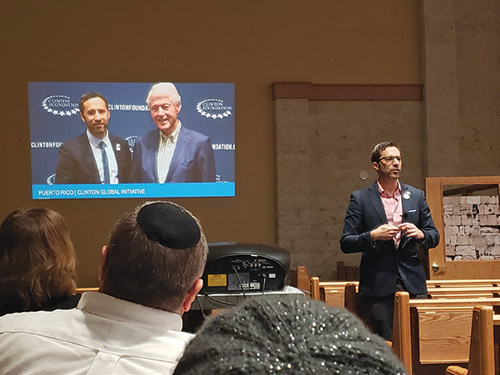

Do you know which non-governmental organization is among the first to arrive and the last to leave when a natural disaster strikes anywhere in the world? If you were among the nearly 100 people attending the recent Orthodox Forum presentation at Congregation Ohav Emeth in Highland Park, you would know that the answer is IsraAID.
Mark Abraham of the Orthodox Forum was quick to note that one of the critical reasons to know about IsraAID is to counteract the anti-Israel narrative that is so prevalent in segments of the world today. It is critical to show the world how much good the tiny country of Israel does, and how they benefit so many people.
Seth H. Davis, executive director of IsraAID USA, spoke about the origin and many accomplishments of the organization. Founded in 2001, IsraAID has worked in emergency and long-term development settings in more than 50 countries around the world. Its mission is to support people affected by natural disasters and/or humanitarian crises by partnering with local communities to provide urgent aid, assist in recovery, and reduce the risk of future disasters.
IsraAID’s strategy to eliminate rising levels of anti-Israel hatred consists of three pillars: saving lives, rebuilding destroyed areas, and bridging connections to people. Their WASH (Water, Sanitation and Hygiene) teams export the Israeli ingenuity and know-how of water technologies to water deprived countries when disasters strike. By necessity, Israel has become a global leader in reducing the levels of mental trauma as a result of the constant rocket barrages in the southern communities and domestic terrorist incidents throughout the country. The skills they have learned have been shared with many countries to help children and adults cope with the losses they have faced. Their search and rescue units are deployed mainly after earthquakes, where they work with the Israeli military units.
Davis noted that the organization responded to nine emergencies in 2017 alone and over 5 million people have been helped. They deployed to North Carolina and Florida in 2018 after hurricanes hit. The key to the organization’s success is that they not only provide initial aid immediately after a disaster, but work with the communities involved to care for the mental and physical needs of the community as normalcy begins to return. The devastation after Hurricane Maria in 2017 left many communities in Puerto Rico without drinking water. It would have been relatively easy to merely hand over cases of bottled water or repair the water purification system. Bottled water would have been a short term solution, and repair of the electrical powered filtration system would leave it vulnerable in the event of a future disaster. IsraAID engineers designed a water purification system that derived its operating power from harnessing the power of gravity, making it viable even if the power grid were to fail.
One key to success in helping after a disaster is asking the local people what they need. Many aid organizations come in and do what they think is needed, but may not be what the people affected want. Allowing people a say in what happens to them serves a role in their recovery.
Davis relayed the moving story of the IsraAid team working in Nepal after an earthquake in 2016. The team was told that there were 22 people missing after a hospital collapsed. Against all odds, they were able to locate one lone survivor alive in the rubble five days after the earthquake. IsraAID teams remained in Nepal long after the immediate needs had been fulfilled. With much of the country in extreme poverty, IsraAID team members created a bee keeping/honey producing project to provide sustainable income to the village.
IsraAID does not have a ‘one size fits all’ methodology for helping at a disaster. Art therapy classes were established in Japan after the 2011 tsunami, as it was hard for the people to express emotions verbally. Using painting and coloring allowed expression of the pain they were feeling and opened the pathway to healing.
Noting that there is a humanitarian crisis in Venezuela that is far more critical than the much-publicized Syrian refugee crisis, Davis detailed how IsraAID teams help unify and organize local populations to provide assistance. Venezuela’s failing economy has led to a severe hunger crisis leading many to enter neighboring Columbia illegally in the hopes of finding food. Fifty years ago, Venezuelans stepped in to help Columbia when they had an economic crisis with many people going hungry. IsraAid organized aid efforts provided by Columbians who were happy to return the favor that was extended to them.
Davis ended the program by answering the unasked question of what can be gained by creating an organization that is specifically designed for helping non-Jews, as IsraAid does not provide help within the borders of Israel. IsraAID was designed to be a non-political organization that exports knowledge for the benefit to humanity. What is gained is the building of bridges between Jews and non-Jews as well as creating a link to something liberal Jews can support to unite the entire Jewish family.
For more information, visit www.IsraAID.org.�
By Deborah Melman�
�













